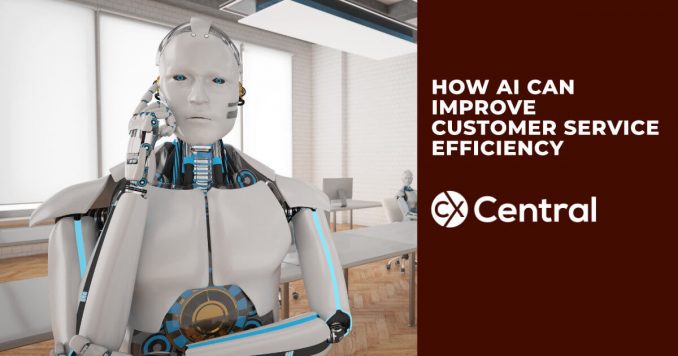In 2025, businesses across industries are adopting artificial intelligence (AI) to improve customer service efficiency. The transformative power of AI is reshaping how companies interact with their customers, offering more personalized experiences while driving operational efficiency. The use of AI in customer service is no longer a luxury—it’s a necessity for businesses looking to stay competitive and relevant in the ever-evolving digital marketplace.
With advancements in AI technologies, companies can now provide faster, more accurate, and highly personalized customer support, allowing for 24/7 engagement and streamlining complex workflows. From intelligent chatbots to predictive analytics, AI is revolutionizing the customer service landscape in ways that were once only imagined. In this article, we’ll explore how businesses can leverage AI to enhance customer service and achieve greater operational efficiency in 2025 and beyond.
The Role of AI in Customer Service
Customer service has always been a critical aspect of business success, but in 2025, AI’s influence has reached new heights. AI technologies, such as natural language processing (NLP), machine learning, and predictive analytics, enable businesses to interact with customers in real-time, offering solutions that are both efficient and personalized. AI systems can process large volumes of data quickly, helping businesses address customer inquiries, resolve issues, and recommend products or services—all with minimal human intervention.
AI has moved beyond simple automation, with platforms able to understand context, anticipate customer needs, and respond with human-like interactions. This has created a new standard for customer service excellence, making it possible to deliver faster, more accurate, and highly satisfying experiences for customers.
AI-Powered Chatbots and Virtual Assistants
One of the most common applications of AI in customer service is the use of chatbots and virtual assistants. These AI-driven systems are designed to answer customer questions, resolve issues, and provide information without the need for human intervention. In 2025, advancements in natural language processing (NLP) and machine learning have made these bots more intelligent than ever before.
Chatbots can handle a variety of customer inquiries, from answering simple questions to assisting with complex issues. By leveraging AI-driven systems, businesses can automate responses to frequently asked questions, schedule appointments, process returns, and even recommend products based on customer preferences. This allows businesses to scale their customer service operations without increasing the number of human agents, resulting in faster response times and more satisfied customers.
In addition to chatbots, virtual assistants like Amazon’s Alexa or Google Assistant have also become valuable tools for customer service. These AI-driven assistants can help customers place orders, find product information, or troubleshoot issues, all with simple voice commands. Businesses can integrate these virtual assistants into their customer service ecosystem to enhance user experiences and streamline operations.

24/7 Availability and Faster Response Times
AI has the unique ability to offer continuous customer service, 24 hours a day, seven days a week. Traditional customer service models require human agents to work within set hours, leaving gaps in support and potentially causing delays in response times. However, with AI-powered systems, businesses can ensure that customers have access to help whenever they need it.
By automating routine tasks, AI enables human agents to focus on more complex inquiries, reducing response times and improving overall customer satisfaction. This combination of automation and human support allows businesses to provide seamless service around the clock, improving efficiency while maintaining a high level of customer satisfaction.
Personalized Customer Interactions
Personalization is one of the most powerful benefits of AI in customer service. AI systems are capable of collecting and analyzing data from multiple sources, including past interactions, purchase history, and browsing behavior. This data can then be used to tailor responses and offers to individual customers, providing a more relevant and engaging experience.
For example, AI can recommend products based on a customer’s previous purchases or browsing history. Similarly, AI can anticipate a customer’s needs and offer proactive solutions before the customer even has to ask. Personalized service not only improves customer satisfaction but also drives sales by providing customers with what they truly want and need.
In industries like digital marketing and online business, businesses are using AI to craft targeted marketing campaigns that resonate with individual customers. By analyzing customer data and behavioral patterns, AI can create personalized advertisements and content, ensuring that businesses engage with their audience in the most effective way possible.
AI-Driven Predictive Analytics
Predictive analytics is a game-changer for businesses looking to optimize their customer service operations. By analyzing historical data and using machine learning algorithms, AI systems can predict customer behavior, identify trends, and forecast potential issues before they arise. This allows businesses to be proactive in addressing customer needs, improving overall service efficiency.
For instance, AI can predict when a customer is likely to experience an issue with a product or service, allowing businesses to reach out to offer support before the problem escalates. Predictive analytics can also help businesses anticipate demand, ensuring that they are adequately staffed during peak times or that inventory levels are optimized to meet customer needs.
Businesses using AI-driven predictive analytics can stay ahead of customer issues, streamline their workflows, and offer a more personalized service experience. This not only boosts efficiency but also helps businesses reduce costs by identifying and addressing problems before they become costly issues.
Reducing Costs and Improving Operational Efficiency
One of the primary reasons businesses are adopting AI in their customer service departments is to reduce costs and improve operational efficiency. By automating repetitive tasks, businesses can free up valuable resources and focus on high-impact activities. AI can handle tasks such as ticket routing, data entry, and order processing, which would otherwise require human agents.
With AI handling these routine tasks, businesses can operate with fewer human agents while still providing a high level of service. This reduces labor costs and increases overall efficiency, allowing businesses to allocate resources to other critical areas, such as product development or marketing strategies.
Furthermore, AI’s ability to identify and resolve issues quickly can significantly reduce the time spent on customer service calls or tickets. This improved efficiency leads to faster resolutions, higher customer satisfaction, and ultimately, a better return on investment (ROI) for businesses.
Integration with Omnichannel Customer Service
In 2025, customer service is no longer limited to a single channel. Customers expect to be able to interact with businesses across multiple platforms, whether that’s via email, social media, live chat, or even in-person. AI plays a crucial role in delivering a seamless omnichannel experience by integrating customer service tools across all platforms.
By integrating AI-powered chatbots, virtual assistants, and predictive analytics into omnichannel platforms, businesses can offer consistent service regardless of how customers choose to engage. For example, a customer who initiates a conversation via social media can seamlessly transition to a live chat or phone call if necessary, with the AI system keeping track of their previous interactions and ensuring a smooth handoff between channels.
This omnichannel integration improves customer experience by providing flexibility and convenience, while also helping businesses maintain efficiency and consistency across all touchpoints.
The Future of AI in Customer Service
The role of AI in customer service will only continue to grow as technology advances. In 2025 and beyond, businesses will continue to refine their AI systems to become even more intuitive, accurate, and personalized. As AI becomes more capable of understanding and predicting customer needs, businesses will be able to deliver an even higher level of service, which will ultimately lead to greater customer loyalty and retention.
However, AI is not meant to replace human agents—it’s meant to complement them. By handling routine tasks and offering real-time assistance, AI allows human agents to focus on more complex, high-value interactions. This synergy between AI and human support will define the future of customer service, where technology enhances the customer experience while maintaining a personal touch.
Conclusion
AI is revolutionizing customer service in 2025, offering businesses a powerful tool to enhance efficiency, reduce costs, and provide more personalized, proactive service. From intelligent chatbots to predictive analytics, AI is transforming the way companies interact with their customers, making it possible to offer faster, more relevant, and highly satisfying experiences.
As AI continues to evolve, businesses must stay ahead of the curve by embracing these technologies and integrating them into their customer service operations. Whether through automation, personalization, or predictive analytics, AI offers endless possibilities for improving the customer experience and achieving greater operational efficiency. For businesses looking to succeed in 2025, AI-powered customer service is a critical investment that cannot be overlooked.
For further insights into the latest trends and innovations in AI and business, explore business trends and discover how AI and automation are shaping the future of customer service.

